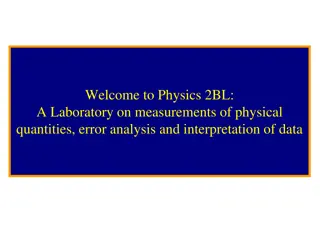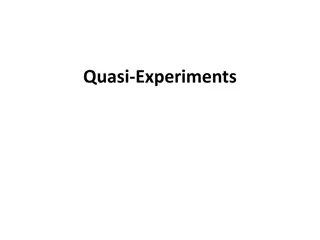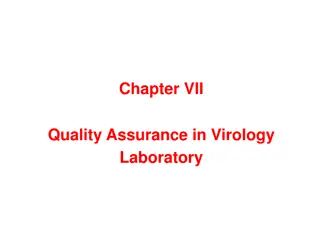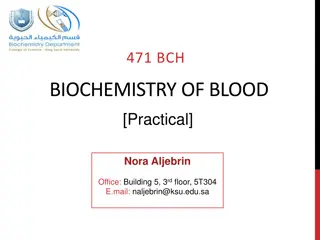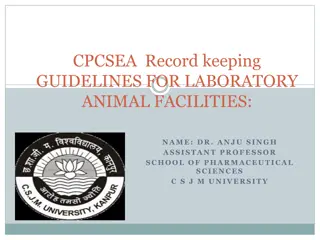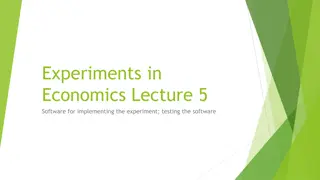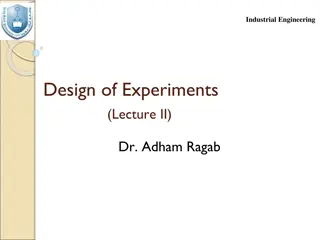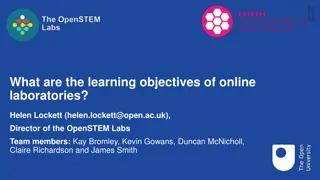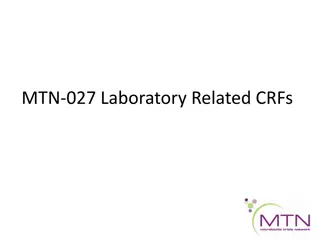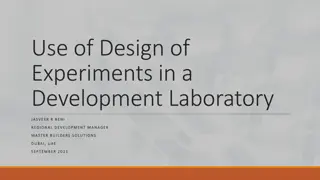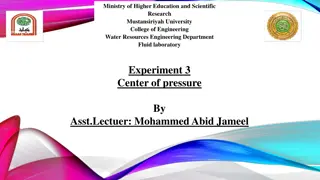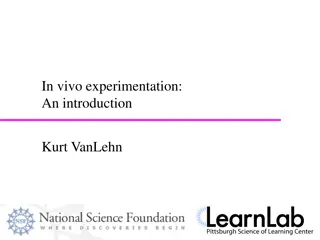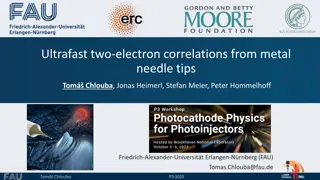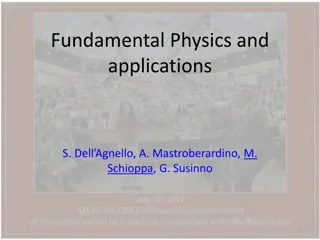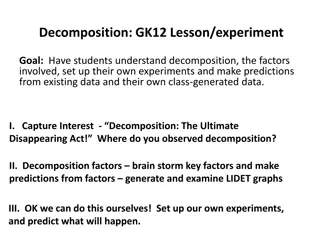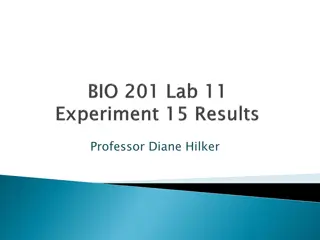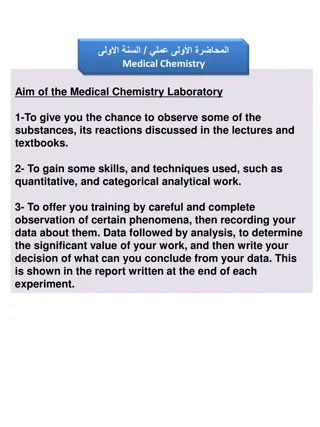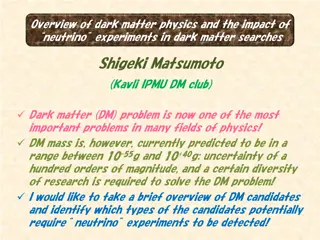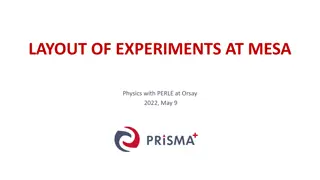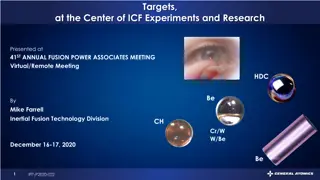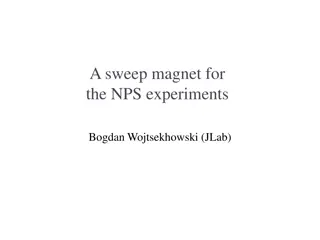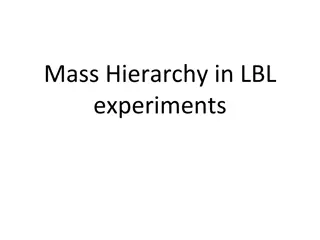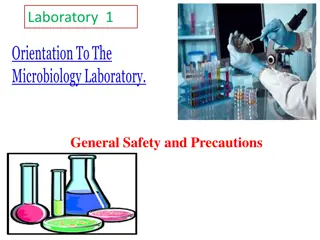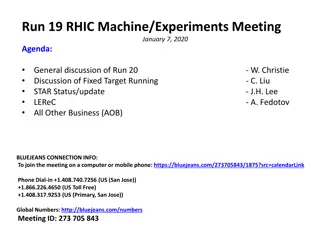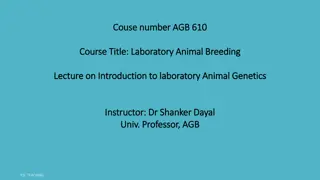Understanding Binomial Experiments and Probability Calculations
Binomial experiments have specific conditions to be met, such as fixed trials and two outcomes. Symbols and notations help represent these experiments. Calculating probabilities of successes in trials involves using functions like binompdf and binomcdf. Examples like determining defective switches o
11 views • 8 slides
Physics 2BL Laboratory: Measurements, Error Analysis & Data Interpretation
This Physics 2BL laboratory course focuses on measurements of physical quantities, error analysis, and interpretation of data. Students learn how scientists create models of natural phenomena and the practical aspects of conducting scientific experiments. Pre-requisites include Physics 2A, 4A or equ
0 views • 31 slides
Enhancing Laboratory Billing Services with MedKarma, A Comprehensive Guide
In the dynamic healthcare landscape, laboratory billing services play a crucial role in ensuring smooth financial operations for medical laboratories. Effective billing practices not only streamline revenue cycles but also enhance overall operational efficiency. MedKarma, a leading provider of labor
2 views • 7 slides
Understanding Quasi-Experiments in Research
Quasi-experiments are research studies that resemble experiments but do not involve random assignment of participants to treatment groups. This approach is taken when random assignment is challenging or when ethical considerations come into play. Unlike true experiments, quasi-experiments can provid
0 views • 15 slides
Quality Assurance in Virology Laboratory
This chapter focuses on quality assurance in virology laboratory, covering topics such as quality control, documentation of test results, laboratory safety rules, and more. It explains the types of quality control, quality assurance cycle, and process areas of quality assurance in laboratory testing
3 views • 19 slides
Biochemistry of Blood Practical Course Overview
This biochemistry of blood practical course involves various experiments focusing on blood components such as plasma, serum, proteins, enzymes, blood groups, hemoglobin, glucose levels, and more. The course outline includes detailed experiments, marking distribution, guidelines for writing scientifi
3 views • 6 slides
Guidelines for Recording Keeping in Laboratory Animal Facilities
The Committee for the Purpose of Control and Supervision of Experiments on Animals outlines the importance of maintaining detailed records in laboratory animal facilities to ensure the well-being and proper management of animals used in experiments. Records ranging from animal house plans, staff hea
4 views • 5 slides
Software Options for Implementing Economic Experiments
Explore various software tools like Z-tree, Visual Studio, and Python that can be used to implement and conduct economic experiments effectively. Learn about the benefits and trade-offs of different software options, and discover online platforms like O-tree and Z-tree unleashed for running experime
0 views • 17 slides
Achieving Comparable Results in Laboratory Practice
Good laboratory practice necessitates minimal error in measurement to reflect a patient's biological condition accurately, ensuring comparable and reliable results regardless of testing location or method. Standardization, harmonization, and traceability play crucial roles in achieving uniformity an
0 views • 29 slides
Introduction to Industrial Engineering Statistics and Experiments
Delve into the realm of Industrial Engineering through Statistics and Design of Experiments in this comprehensive lecture series by Dr. Adham Ragab. Explore the practical applications of statistics, differentiate between population and sample, calculate statistical variables, and understand the sign
0 views • 25 slides
Advanced Fission Experiments at University of Michigan
The University of Michigan, under the guidance of Dr. Sara A. Pozzi, conducts cutting-edge fission experiments leveraging organic scintillation detectors. These detectors offer advantages such as nanosecond-scale response times, energy proportionality, and scalability. The experiments focus on impro
0 views • 4 slides
Insights into Hematology Laboratory Practice
This resource explores the potential role of hematologists in laboratory settings, discussing board certification, advantages, challenges, current training trends, and core curriculum lectures in hematology. It sheds light on the critical areas of laboratory training, emphasizing the importance of u
0 views • 9 slides
Understanding the Basics of Experiments in Social Sciences
Delve into the world of experiments in social sciences with a focus on experimental designs, ethical considerations, and intriguing questions like predicting helping behavior in emergencies. Explore how studying helping behavior in experiments can shed light on complex human interactions and behavio
1 views • 30 slides
Understanding the Objectives of Online Laboratories in STEM Education
Online laboratories offer interactive experiments over the internet, providing remote and virtual practical experiences in STEM education. The OpenSTEM Labs project aims to explore various activities and outcomes in experiments, focusing on classification schemes and learning objectives. The purpose
0 views • 17 slides
Laboratory Related CRFs for Pharmacokinetics Study
This collection encompasses various CRFs related to laboratory procedures in the context of Pharmacokinetics for a study. It includes forms for enrollment, specimen storage, safety laboratory results, and specific days for sample collection. The CRFs detail the storage, collection, and documentation
0 views • 14 slides
Utilizing Design of Experiments in Development Laboratories
Design of Experiments (DoE) is a crucial methodology in product development laboratories, enabling faster analysis of multiple factors and interactions. This approach accelerates the product development process and enhances competitiveness in the industry. By incorporating statistical tools and well
0 views • 11 slides
Advanced Plasma Control Systems in Fusion Experiments
The construction of control systems for high-performance plasma with limited actuators or diagnostics is crucial for ongoing fusion experiments like ITER and DEMO. This involves developing control logic, categorizing various parameters, and understanding actuator systems. Multiple control experiment
2 views • 25 slides
Understanding Hovercrafts: Principles, Experiments, and Applications
Explore the fascinating world of hovercraft technology through detailed explanations, experiments, and insights on how these vehicles work. From the basic concepts and terms to practical experiments you can try at home, uncover the science behind hovercrafts and their versatile capabilities. Dive in
0 views • 17 slides
Understanding the Center of Pressure in Fluid Mechanics Experiments
The concept of center of pressure in fluid mechanics is explored through experiments to find water pressure forces on surfaces immersed in water. Theoretical background equations for partial and complete immersion are provided, along with objectives related to determining water pressure forces and c
0 views • 13 slides
Understanding Fair Testing in Experiments
Explore the concept of fair testing in scientific experiments, learning about variables, controls, and the importance of unbiased testing methods. Discover how to design fair experiments and analyze results effectively.
0 views • 18 slides
Overview of In Vivo Experimentation in Educational Research
This introduction to in vivo experimentation by Kurt VanLehn covers the motivation and definition of in vivo experiments, examples, distinguishing features from other experiments, and popular experimental methods like laboratory and classroom experiments. The content addresses the need for external
0 views • 46 slides
Ultrafast Two-Electron Correlations From Metal Needle Tips in Photoemission Experiments
Study explores ultrafast two-electron correlations from metal needle tips during photoemission experiments using femtosecond laser pulses. The evolution of photoemission experiments at gases and surfaces, multi-electron dynamics, experiment setups, energy anti-correlation, and potential applications
0 views • 11 slides
Advances in Experimental Particle Physics and Metrology Technologies
This collection of images and text highlights the essential aspects of fundamental physics experiments, particle physics detectors, and the Atlas ITk project. It also focuses on the importance of metrology for physics and satellite experiments, with a specific emphasis on laser technologies. The con
0 views • 11 slides
Understanding Decomposition: Experiments & Predictions for Students
Engage students in understanding decomposition through hands-on experiments, predictions based on factors, and analysis of data. Explore various decomposition examples, set up experiments with different variables, and analyze outcomes to enhance comprehension. Utilize resources like LIDET graphs and
0 views • 10 slides
Microbiology Laboratory Experiments Overview
This overview showcases various microbiology laboratory experiments conducted to examine the physiology of bacteria, enzymatic activities, and biochemical reactions. It includes experiments on Phenol Red Dextrose Broth, Phenol Red Lactose Broth, Nitrate Broth, Tryptone Broth, and more. The provided
0 views • 26 slides
Laboratory Safety and Guidelines in Medical Chemistry
The aim of the Medical Chemistry Laboratory is to provide students with practical observations, skills, and techniques related to substances and their reactions discussed in lectures and textbooks. Essential safety rules are outlined to ensure a secure working environment, emphasizing proper handlin
0 views • 5 slides
Overview of Dark Matter Physics and Neutrino Experiments
The search for dark matter (DM) is a crucial challenge across various physics fields due to the wide range of predicted masses and uncertainties. DM candidates include stable, neutral, cold, and weakly interacting particles, with potential types like axions, SIMP-like, and WIMP-like DM. Neutrino exp
0 views • 9 slides
Latest Developments in Physics Experiments at MESA Orsay 2022
Developments at MESA include the layout of experiments, status of the 5 MeV Injector, operational modes, fixed target experiments, challenges in the EB-Experiment P2, procurement updates, energy recovery mode in MAGIX, and upcoming spectrometer deliveries. Exciting advancements and projects are unde
0 views • 16 slides
Advances in Target Manufacturing for Inertial Confinement Fusion Experiments
Target manufacturing for inertial confinement fusion (ICF) experiments is a crucial focus area, with recent advancements highlighting the need for precision and detail in target design and fabrication. The presentation at the 41st Annual Fusion Power Associates Meeting emphasized the importance of m
0 views • 13 slides
Cutting-edge Nuclear Physics Experiments and Kinematics Insights
Explore the latest developments in nuclear physics experiments, featuring advanced equipment like Asweep magnet and detailed kinematics analysis of experiments such as SI pion, DVCS, and WACS. Discover solutions to field problems and innovative solutions using images and descriptions from the NPS bi
0 views • 15 slides
Understanding Multi-Stage Probability Experiments
Explore single-stage and multi-stage probability experiments in contemporary mathematics. Learn how to determine sample spaces of experiments using tree diagrams, tables, and outcomes. Discover the concepts of independence and dependence between stages in multi-stage experiments through practical ex
0 views • 18 slides
Understanding the Role of Soil in Plant Growth Experiments
Explore how experiments help determine if plants need soil to thrive, delving into the essential components for plant growth and the methods used to study their requirements. Engage in predicting outcomes and designing experiments to test the necessity of soil for plant life.
0 views • 12 slides
Insights into Mass Hierarchy Determination in Long-Baseline Neutrino Experiments
Combining appearance probabilities of electron and anti-electron neutrinos in long-baseline experiments can help determine the mass hierarchy, with ongoing experiments collecting significant data by 2020. Analyses point to CP violation possibilities, with updates expected in Neutrino2016. The capabi
0 views • 6 slides
Laboratory General Safety and Precautions
Microbiology involves the study of microorganisms such as bacteria, fungi, viruses, and parasites. It is crucial to maintain strict safety protocols in the laboratory to prevent contamination and ensure the well-being of individuals handling these potentially pathogenic organisms. Rules like wearing
0 views • 26 slides
Understanding Special Topics in Design: Factorial Experiments and Fractional Designs
This content delves into the world of factorial designs used in design experiments to identify important factors and interactions. It explores 2k full factorial designs and their application in screening potential factors. Additionally, the content discusses 2k-p fractional factorial designs and the
0 views • 19 slides
Steps to Success: Conducting Scientific Experiments
Scientific experiments play a crucial role in discovering new things. Follow a specific order of steps outlined in the guide to successfully conduct experiments. Begin by understanding biological phenomena, formulating hypotheses, planning, performing experiments, observing results, and drawing conc
0 views • 29 slides
Summary and Updates from RHIC Machine Experiments Meeting
General discussion and updates from the Run 19 RHIC Machine Experiments Meeting held on January 7, 2020, including discussions on Run 20, Fixed Target Running for STAR, LEReC status updates, and other business matters. Key points covered include the schedule assumptions, interleaving LEReC commissio
0 views • 10 slides
Understanding Laboratory Animal Genetics and Research Importance
This course (AGB 610) delves into the realm of laboratory animal breeding, exploring the significance of using animals in research and teaching. Dr Shanker Dayal, a distinguished professor, guides students through lectures on animal genetics and the common uses of laboratory animals. The course emph
0 views • 14 slides
Exploring the Role and Objectives of Laboratory Teaching
The content delves into the various perspectives on laboratory teaching, its aims, pedagogical levels, and common challenges faced. It discusses specific aims of laboratory teaching, including familiarization with equipment, teaching experimental work attitudes, and training in observation and deduc
0 views • 32 slides
Guidelines for Nomenclature of Laboratory Mouse and Rat Strains
Laboratory mice and rat strains have specific nomenclature guidelines to account for their genetic backgrounds and origins. Mouse strains are registered through the Mouse Genome Database, while rat strains are registered through the Rat Genome Database. The use of Laboratory Registration Codes is cr
0 views • 14 slides

